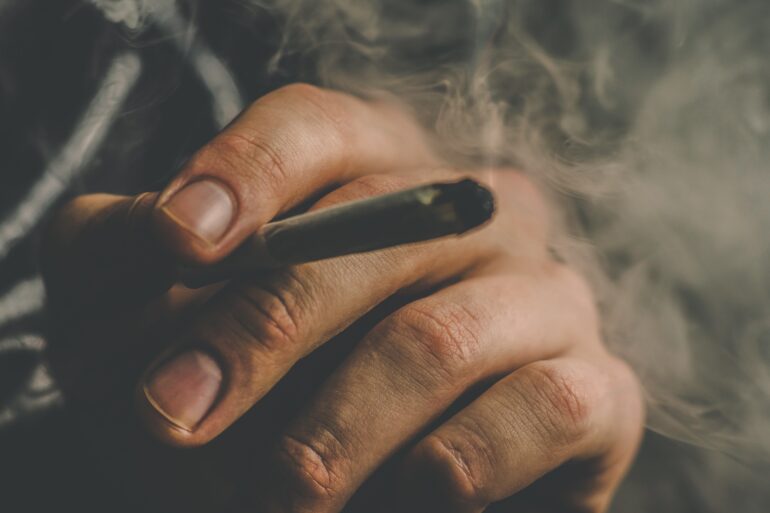Key Takeaways
- Chewing black peppercorns may be able to bring you down from a high, but it probably won’t be enjoyable.
- It’s much better to take CBD or CBG oil with terpenes to tame a THC high.
- Mango could theoretically make you higher because of myrcene, but you’d have to eat a lot!
Terpenes are the unsung heroes of cannabis. While cannabinoids get most of the attention, terpenes contribute to the aroma of our favorite plant and contribute more to the effects than you might realize.
A famous 2011 paper from Dr. Ethan Russo discussed the entourage effect with cannabinoids other than THC and terpenes, and in the process suggested that several terpenes might be able to blunt an unpleasant THC high.
But is it true? And can any terpenes actually increase your high?
We spoke to worldwide cannabis consultant, science advisor, and terpene expert Dr. Abraham Benavides (a.k.a. Dr. Abe) about how terpenes can impact your high.
Can Terpenes Reduce Your High? The Black Peppercorn Hypothesis
In Dr. Russo’s paper – and elsewhere in the cannabis space – black pepper is suggested as a possible antidote to excessive cannabis intoxication because it contains pinene and other terpenes. But is this effective? Is it a good idea?
Dr. Abe points out that this isn’t exactly the best approach if you consider the overall experience, “I’ve heard of the anecdotal chewing of peppercorns, but I’ve never tried it personally nor have asked someone to do so. I bet it would leave a bad taste in their mouth and probably turn them off from the cannabis experience if they’re a beginner, which is most likely the case here. So I wouldn’t recommend this as the first thing to try, only if you are desperate and have nothing else on hand.”
Theoretically, it could work, but practically it isn’t such a useful suggestion.
Dr. Abe reiterated the most important advice for this type of situation, “The reality is that it’s always best to prevent these overboard situations by knowing what you’re getting into first. Starting low and going slow, or working with a cannabis coach like me to chart the right course and expectations ahead of time.”
However, if it’s too late to follow this advice, Dr. Abe suggested a more effective strategy that won’t put you off the experience:
“If someone has too much THC, I’d suggest they take at least an equal or larger dose of CBD or CBG oil to throw the ratio back towards these anti-anxiety cannabinoids. This is a better idea, especially since my patients’ hemp oils usually already have calming terpenes in them. The hemp-based cannabinoids plus terpene blends provide a more comfortable, tolerable, measurable, and accessible way to counteract the high and panic.”
So while black peppercorns might be helpful if there are no other options, the best advice is to use CBD oil to bring yourself back down – especially if it’s a terpene-rich oil.
RELATED: Here’s What You Should Do If You’re Still High Days After Eating an Edible
Can You Use Terpenes to Get More High? The Myrcene and Mango Method
One approach mentioned by Dr. Abe in his Beginner’s Guide to Terpenes is the idea that people eat mangos to get even higher when they consume cannabis.
This might not be as serious a concern as coming down from an unpleasant high, but if you do want to get more high, can it work?
Dr. Abe pointed out that evidence is limited, “Today’s research doesn’t have the hard clinical data to back up this claim yet. However, the basic idea of myrcene possibly helping to transport cannabinoids into the brain is still recognized in recent publications. Also, a new groundbreaking study shows several terpenes including myrcene and other common cannabis and citrus-type terpenes like limonene can increase the effects of THC at the CB1 receptor. This may also enhance pain-relieving and other effects.”
But Dr. Abe concluded, “So while it’s not concretely proven in humans, it also doesn’t necessarily cause harm for people to eat mangoes or citrus fruits to increase the high unless they are allergic or have heartburn. The cost of terpene customization is also less than mangoes, and since both are such low risk, it’s worth a try.”
There is also a bit of a practical issue with eating mangos to get higher, as Dr. Abe explained, “Keep in mind that since oral bioavailability of terpenes like myrcene and limonene are poor, because terpenes are fat-loving like cannabinoids are. You’d probably have to eat quite a bit of mango or other citrus fruits at least a half-hour or so ahead of time to get noticeable effects.”
However, if you have the option, it can work. Dr. Abe can attest to this personally, telling us, “Where I live in Costa Rica, I have seven mango trees and await each harvest season with anticipation. I can personally appreciate the difference, but it does take a large serving.”
Terpenes Are Useful, But Cannabinoids Still Rule
Our conversation with Dr. Abe underlined something that is important to remember: the entourage effect from terpenes is a real phenomenon and something to take seriously, but cannabinoids are still king.
You can certainly try to bring yourself down from a high with black peppercorns, but you’re probably better off focusing on CBD and CBG with some terpenes as a booster.
Likewise, you can get higher if you’re sitting on a seven-tree mango harvest like Dr. Abe, but otherwise, it’s probably easier to just incrementally increase your dose of THC.

